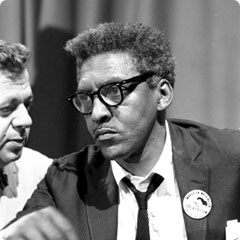 |

Bayard Rustin at a news briefing during the March on Washington, 1963.
Library of Congress, Prints and Photographs Division
|
 |
Bayard Rustin, who came to Harlem to attend City College in the early 1940s, recalls Harlem congressman Adam Clayton Powell from that period. At City College, Rustin was an organizer for the Young Communist League and then began to work for A. Philip Randolph. Bayard Rustin's negative feelings about Powell, revealed in this segment of the oral history conducted in 1985, were undoubtedly strengthened by later events. In 1960, Adam Clayton Powell threatened to tell Congress about Rustin's homosexuality, causing Martin Luther King, who had worked closely with Bayard Rustin during the Montgomery Boycott and thereafter, to publicly break with Rustin.
 Read Oral History Read Oral History
|
 |
|
 |
 |

"There is in Harlem a connection between politics and public performance . . . everyone expects a good show. And you tend to get politicians who are larger than life."
—Manning Marable


The flowering of Harlem music, theater, and writing is explored by Columbia faculty and recalled by eminent African Americans social leaders.


Harlem at different times was a magnet for Jews, West Indians, and African Americans from across the United States.


Reflections on Adam Clayton Powell, the odyssey of David Dinkins and political culture itself in Harlem.


Quotations on Columbia’s role in the Harlem community.


The Institute for Research in African-American Studies at Columbia.


One of the most prominent black Americans of the 1930s and 1940s, Robeson won critical and popular acclaim for his stage and screen roles.


From Sid Luckman to Franklin D. Roosevelt, Columbians have often been ahead of their time.
|
 |
|
